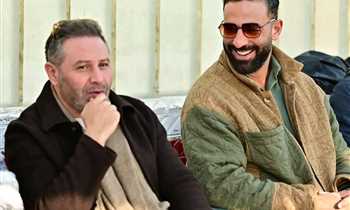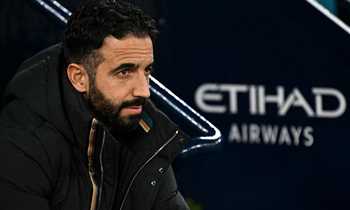
كتب : عمر عبد العزيز | الأربعاء، 11 سبتمبر 2013 - 22:37
Egypt will never find another Bradley
Almost every Egyptian citizen is struggling in his own field of play, let’s face it…so how about a foreigner – an American – trying to achieve something that has been regarded as a customary failure for this country during the past couple of decades.
Should Egypt make it to the World Cup, if there’s a fairytale qualifying campaign to be singled out from among the 32 nations in Brazil, it will be Bradley’s two-year stint at the Pharaohs helm.
I won’t sing praises of Bradley hanging on by his fingernails in an absolutely terrible working environment, but I would like to highlight that the man has never complained about it.
Bradley and his crew – most notably his hard-working assistant Diaa Al-Sayed – have been paddling their own canoe with an astute we-don’t-want-any-trouble style, in a naturally explosive country.
Such an evasive approach – the best to be used in Egypt these days – always kept this staff focused on one objective even at the toughest times.
Bradley has never revealed his political views despite living in a society torn apart by ideologies and partisanism, nor did he attempt to appease Egyptian people with any sort of cheap non-football clichés.
The CAN 2013 shock
When Egypt were hit by that earth-shattering defeat to Central African Republic last year, it was the perfect wake-up call to shake the players out of their slumbers and ensure everyone involved that nothing will be easy.
A significant conclusion worth noting after that infamous CAN 2013 failure was how did Bradley react…and at that point precisely, the American showed his class.
First, he didn’t complain nor he jumped to that typical excuse of the ‘tough conditions and lack of support’….etc.
He didn’t blame the players or the incompetent FA board, instead he took full responsibility for the defeat and vowed to focus on the more important World Cup objective.
The Egypt management also showed great composure dealing with some traditional Egyptian media bull####, which created an ‘internal rift’ between Bradley and his crew.
Do Egypt have a strong team?
One might argue that beating the likes of Zimbabwe, Mozambique and Guinea is not exactly a genuine indication of how Egypt have progressed throughout the past couple of years.
It is a fair notion to be honest, but a deeper look into Egypt’s current technical features would suggest that this side is on course to regain its status as one of Africa’s powerhouses.
It is no longer a team relying on a ‘golden-generation-Manuel-Jose-inspired’ Ahli side, or some high-profile Europe-based players or even a legendary goalkeeper in Essam Al-Hadari.
It is fair to say that Bradley has succeeded in rebuilding a team comprising veterans, youngsters and unfancied players, while managing to contain a bunch of unhappy heavyweights like Al-Hadari and Ahmed Hassan.
Key players blow, no league and the Zaki example
Let’s not ignore a very important detail when assessing Egypt’s World Cup qualifying campaign even before the decisive final round.
For most of the past 12 months, Egypt were deprived of their first-choice center-half, two irreplaceable midfield schemers and most prolific striker, apart from losing a legendary figure like Al-Hadari
Ahmed Hegazi, Hosni Abd-Rabou, Hossam Ghaly and Geddo - that is a key player or more in every department - have all fallen to serious long-term injuries in the space of four months.
This - in addition to the fact that three high-profile players like Shikabala, Amr Zaki and Mohamed Zidan were forced to stay at home for six months after being released by their respective clubs in January - is quite a serious damage.
So it is an ordeal of frequently losing indispensable personnel, plus the devastating blow of seeing your primary source of selecting players shut down by the suspension of domestic football.
Yet now it seems like Egypt have alternatives and it’s the coach’s clever approach in dealing with an out-of-sorts setup that allowed him to rebuild this team without much casualties.
Finally, it must be said that many of Egypt’s experienced players – those who comprised the core of the team at the Hassan Shehata era – have hardly helped in the process of reconstruction.
The names are well-known and one of them is the stroppy – yet influential – Amr Zaki, who enjoyed a scoring return only because his manager opted to ignore a history of controversy and reported rifts for the sake of the team.
مقالات أخرى للكاتب
-
من فتحي مبروك لجاريدو..الأهلي حافظ مش فاهم الثلاثاء، 08 يوليه 2014 - 02:16
-
لهذه الأسباب...#تحيا_الجزائر الثلاثاء، 01 يوليه 2014 - 16:26
-
تحليل: الخطأ الشنيع الذي أسقط مصر في غانا الأربعاء، 16 أكتوبر 2013 - 18:10
-
Ghana have every right to protest against Egypt fixture الأربعاء، 09 أكتوبر 2013 - 00:45
نرشح لكم
 ميدو: لن أدرب الزمالك وهذا سبب تصريح "شيكات مفتوحة".. ولا نخطط لضم رمضان صبحي
ميدو: لن أدرب الزمالك وهذا سبب تصريح "شيكات مفتوحة".. ولا نخطط لضم رمضان صبحي
 ميدو: زيزو قرر الخروج من الباب الصغير.. وهذا سبب رفض العروض السابقة لبيعه
ميدو: زيزو قرر الخروج من الباب الصغير.. وهذا سبب رفض العروض السابقة لبيعه

 خبر في الجول - الونش يجدد تعاقده مع الزمالك 3 سنوات
خبر في الجول - الونش يجدد تعاقده مع الزمالك 3 سنوات
 محمد معروف حكما لمباراة الزمالك وحرس الحدود
محمد معروف حكما لمباراة الزمالك وحرس الحدود
 المندوه يوضح حقيقة سرقة أموال من خزينة الزمالك
المندوه يوضح حقيقة سرقة أموال من خزينة الزمالك

 مصدر من الأهلي لـ في الجول: لم نتلق إجابة من وزارة الرياضة حتى الآن.. وهذا هو المنطقي
مصدر من الأهلي لـ في الجول: لم نتلق إجابة من وزارة الرياضة حتى الآن.. وهذا هو المنطقي

 بيان الزمالك: نهاية العلاقة مع زيزو بعد وصولها لطريق مسدود.. وتحويله للتحقيق
بيان الزمالك: نهاية العلاقة مع زيزو بعد وصولها لطريق مسدود.. وتحويله للتحقيق












































